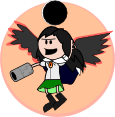I love dragons. I play a little more loose with alignments on them, though Good metallics and Evil chromatics is still the norm, and type indicating elemental affinity just makes sense (nobody whines about fire elementals always being tied to fire). I do scrap the rankings, though; a black dragon and a gold dragon are only different by appearance, movement modes, and breath weapon. Stats, HD, and a few other things are determined separately.
As far as running them as NPCs, I tend to lean toward four basic types:
The Little One - The dragon is not fully grown, anywhere from just hatched to maybe 20-30 years old. Young dragons tend to be childish, and depending on the individual, can vary from feral (low intelligence and/or Chaotic Evil) to blindly idealistic (any Good), but are most defined by being inexperienced and at the same time believing they’re the strongest thing within a mile - after all, they’re dragons! In a story, they’re useful to set the tone of a story, to feel out what kinds of PCs are being played (do you kill it or try to reason with the creature killing local game that hunters need). They are, unless the game takes place over centuries, never going to be a big bad, and normally either become allies or are killed and quickly forgotten.
The Brute - Dragons who are defined by their strength and brutality. Whether Good or Evil, a Brute is a dragon who doesn’t just think they’re the biggest and strongest thing around, but knows it, and revels in it. An Evil Brute terrorizes local villages, either in their natural form while demanding tribute, or taking a humanoid form through magic and living a devil-may-care life, slaughtering anyone who challenges their desires. A Good Brute meanwhile is not too different from an adventurer, seeking out Evil and hoping to bash its head into the ground. Neither takes much stock in building any firm alliances - such things are either beneath them or feel secondary to their goals. Brutes need not be low intelligence, even if they often are. The defining aspect for them is their solo nature. Brutes should be run as a force of nature, and work best in Black and White morality games.
The Scholar - Normally a side character. Scholars, whether in a city or in a remove cave, are more interested in some form of study or research over actively shaping the world. A Good Scholar is often someone who during a story is to be sought out for advice or information, who themself for reasons within the story is not inclined or unable to directly interfere with the world as is. An Evil Scholar meanwhile is often the precursor to a Dracolich, or otherwise likely threatens the world/planes via their research. Scholars, obviously, are best seen as representative of the ideals and danger of knowledge, when looked at literarily.
The Xorvinthal Player - Named after the draconic, world chess game, the Xorvinthal Player is the opposite of a Brute, and leans into the fact that dragons, especially with time, can grow to be as intelligent compared to a Wizard as a Wizard is to a common person. Xorvinthal Players may be advisors or kings, but always have contacts far and wide, and to fight them is sometimes to declare war on half the world. Xorvinthal Players prefer to leverage political power or their often vast wealth (both of which only accrue as the centuries roll by) against their enemies rather than dirty their claws personally. And, at the end of the day, even if someone survives everything else, they still have to contend with a dragon. A Xorvinthal Player is best played as someone mentioned often and seen never. “They king’s advisor suggested against it.” “The boss approved your pay.” I personally think of the Sibyl System in Psycho-Pass as a non-D&D example of this, where the identity is kept secret and only by further exploration is the truth revealed.
***
That last bit emphasizes a broader point: Dragons are not fundamentally different from any other enemy. At the end of the day, they’re still a stat block. I look at that as “At their lowest point, what does this enemy have going for them?” A dragon, on their worst day if they were otherwise ruined and lost everything they owned and every ally they had ever made, is still a dangerous enemy against an unprepared party (or worse, individual). For example, see V and the Black Dragon before the deal is made.
But, they’re also characters which, if not children, have survived centuries and in most cases intend to live many more. Read some alignment handbooks if you need inspiration on outlooks, and then apply that to someone whose childhood was longer than you’ll likely live, and who remembers when great wars were fought and forgotten empires were at their peaks.
If you can’t make an interesting villain, ally, quest giver, or even encounter with any of that, then that falls on a failure of imagination, not on the game designers. You’re the story teller, the game is just the medium through which the story is told. Orcs, vampires, and dragons are all equally interesting or boring, depending on the DM.
View Single Post
Thread: Regarding Dragons
-
2019-09-07, 04:40 PM (ISO 8601)Titan in the Playground


- Join Date
- Jul 2011
- Location
- The Middle of Nowhere
- Gender

 Re: Regarding Dragons
Awesome avatar by Cuthalion
Re: Regarding Dragons
Awesome avatar by Cuthalion
Spoiler: Old Avatars


By Ceika, Ceika, Linklel (Except for one that appears to be lost to time)


 Reply With Quote
Reply With Quote